From another era: the decade's most sexist ads ft Protein World, Carl's Jr, Lynx and more
UK ad rule-makers, the ASA and the CAP, have introduced measures to clamp down on offensive ads that perpetrate sexist stereotypes, underlining that work featuring unhealthy depictions of each gender is still being created and distributed by agencies.
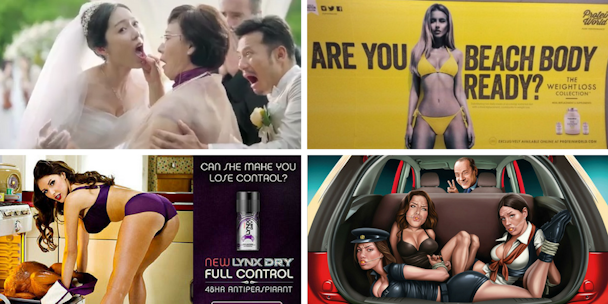
Some sexist ads from the last decade
The ASA said that UK brands would have to walk “a tougher line" as offending ads can "potentially cause harm, including [those] which mock people for not conforming to gender stereotypes".
The issue is expansive and reaches beyond the UK. Furthermore, while it is easy to look to times-long past and point fingers at obviously sexist ads (see below), contemporary agencies are still crossing the line.
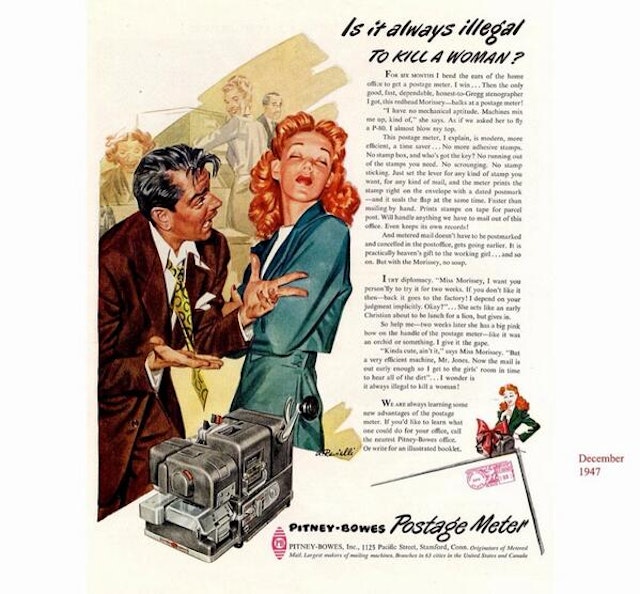
Recent research underlines that the mantra 'sex sells' is all but an irrelevant and inaccurate foundation upon which to build a campaign. This may be the main reason why brands are looking for new ways to incorporate more forward-looking ways to represent women, men and minorities on screen.
Here are some of the most sexist ads to crop up over the last decade. Each has sparked complaints and bans of their own, while the first landed earlier this week.
1. Audi
This ad, run by Audi in China, depicts a bride-to-be being inspected with the intensity a new car-buyer would have on a showroom. The company quickly pulled the ad, a piece of creative it "deeply regrets".
2. Protein World
Next we jump straight in with Protein World, a supplement company that came from nowhere in 2015 to be the de facto sexist ad case study after it asked London commuters: 'Are you beach body ready?'
People did not like being told what aesthetic must be adhered to in order to attend a beach, resulting in the ads being petitioned for removal and defaced. Sympathetic parties thinking: 'Yeah, I want to look my best if I'm undressing on the beach' were quickly put off by how the company handled those unhappy with the campaign on social media.
The ASA received 378 complaints about the ad but it notably escaped a ban. It was however already under investigation for a range of health and weight-loss claims it had made. It is largely responsible for sparking the ASA's sexism in ads debate that helped introduce the new measures.

3. Lynx
Body spray brand Lynx regularly relied on sexist content and tired stereotypes to sell teenage boys the idea that its fragrances are babe magnets. As a result, the smell is now synonymous with gym locker rooms.
A 2011 campaign starring Lucy Pinder particularly irked censors and was banned as a result.
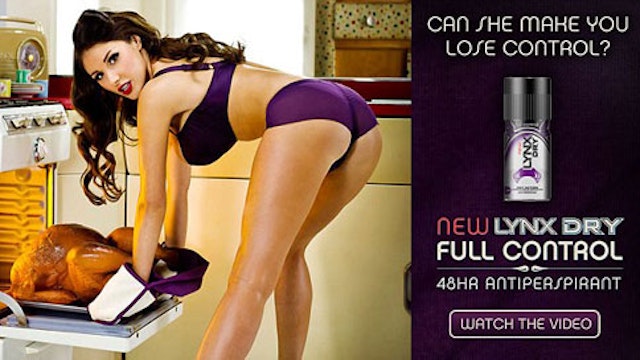
As the rhetoric advanced in years, Lynx took a post-modern, ironic look at its portrayal of women. But it eventually shed that skin and is now an evolved brand that, is in a rather apologetic manner, is looking to challenge perceptions and stereotypes around men.
4. Carl's Jr
Fast food chain Carl's Jr was a regular offender for sexist ads, oftentimes turning up at the Super Bowl with ads crammed with sexual tension and greasy overstacked burgers.
This ridiculous spot for Super Bowl 2015 featuring Charlotte McKinney was banned.
The brand, much like Lynx, claims it has grown up, moving away from the 'babes and burgers' to focus on the food with the return of ficitonal boss Carl Hardee Sr, who has had enough of his son's wicked ways.
It is a retrospective piece that addresses many of the problems many have with the brand - although whether it stays the course remains to be seen.
5. Yorkie
Yorkie, a chunky UK chocolate bar, in used to play with the tagline, 'It's not for girls'. The phrase was also featured predominately on its branding.
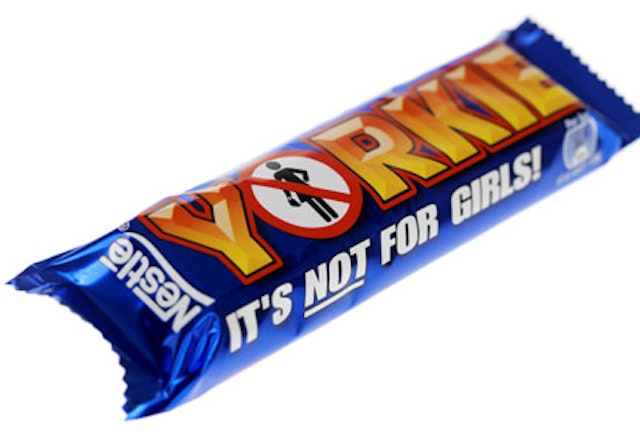
While the messaging was tongue-in-cheek, and was not reliant on overly-sexualised imagery, it literally ran through a list of stereotypes. The tagline lasted a decade since 2002, and was replaced by the slightly less troublesome 'Man Fuel for Man Stuff'.
6. McCoys
The male confectionery market (if such a thing even exists) was also tapped by crisps brand McCoys. In 2009 it made the blokeiest ads ever in its 'Man Crisps' drive.
In the ad, a man who plays the soppy Donny Osmond single Puppy Love on a pub jukebox is suctioned out of the bar for his wayward tastes. His crisps are confiscated: his musical tastes have proven him not man enough to eat salted potato crisp snacks.
7. Ford
JWT India created some sketchy Ford print ads in which women are abducted by famous Ford drivers. It is important to note that Ford never approved the ads to run, however, they still saw the light of day, reflecting more on the agency than the client.
One of the 2013 ads poked fun at then Italian prime minister Silvio Berlusconi.
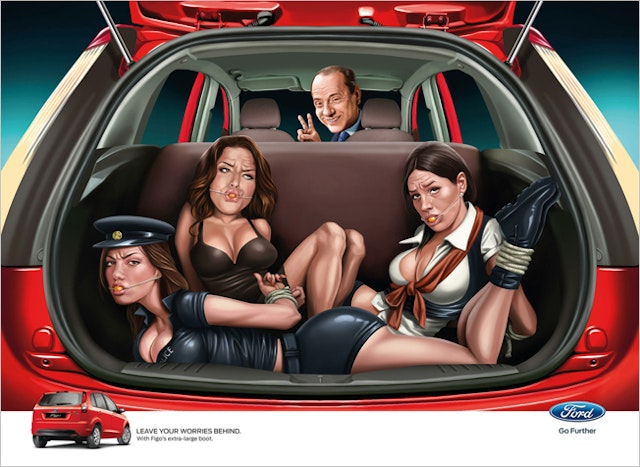
Another played on the rivalry between the Kardashian family and Paris Hilton and led to a pontential lawsuit.
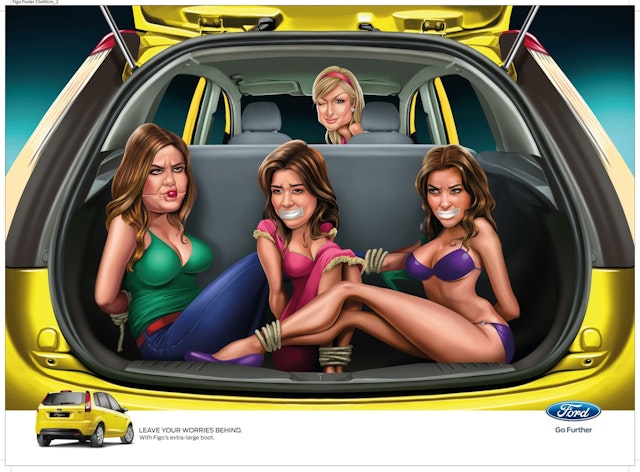
8. Peta - USA
Peta has built a brand upon shocking audiences. It claimed its NSFW ad was blocked from appearing during Super Bowl 2016 – although such a statement could be deployed to drum up headlines while saving $5m - a strategy that earned the video millions of views.
The ad, called 'Last Longer', claims that meat-eaters cannot last as long as veggie lovers in the bedroom. It shows a full 38 seconds of full frontal sex and denigrates all involved parties while poking fun at erectile dysfunction.
As the likes of Lynx and Carl's Jr reposition to a more savoury base, many brands are making a concerted effort to get on the right side of this debate. In the US, Reebok took a stab at president Donald Trump for focusing on the appearance of the first lady of France. Cards Against Humanity is another recent example, running an ironic and exclusively pink version just for women.
Speaking to The Drum earlier this week, Tim Doust, founding partner at FCB Inferno – the agency behind Sport England's widely lauded 'This Girl Can' campaign – worried that any more restrictions could stifle creativity.
However, he added: "I feel that the ads most likely to be affected by this code are either suffering from a serious lack of creativity in the first place or keen to get the headlines stemming from any controversy - I’m looking at you, Paddy Power.
“Humour – which is of course so hugely important in the UK - is particularly likely to polarise opinions, but humour where the scapegoat is a stereotype seems now to be very old-fashioned and I’d be more than happy to see the back of [those ads]."
The Drum polled Twitter users for some of the most sexist ads that they thought should make the cut.
You'd expect it from a beer company sure, but car insurance? pic.twitter.com/b2KP7eU83P
— Will Collis (@TheWillCollis) July 19, 2017
Good call. Yeesh again. pic.twitter.com/33PXyqTUzG — John McCarthy (@JohnGeeMcCarthy) July 19, 2017
I forgot all about that *even though I wrote it up at the time* Good call!https://t.co/SdIcQdFPnE
— John McCarthy (@JohnGeeMcCarthy) July 19, 2017
https://t.co/rnhNsAuOLB Not an ad but social content from London Dungeon which was pretty horrendous — Elle Panes (@ellepanes) July 19, 2017
Almost all adverts about domestic violence awareness are focused on women https://t.co/zCRzCP0cM6
Men can't be vunerable? pic.twitter.com/TDoui5GxTK
— John Truong (@JTruongUK) July 19, 2017
Supermarket ads took a lot of flak.
Anything aimed at mums. P&G, Asda xmas ad (most supermarket xmas ads). Stereotypes of competent mums & doofus dads https://t.co/4pO58uuFEX — Lynn Nothegger (@Lynn_Nothegger) July 19, 2017
Most Asda & Tesco ads. Although most women do the bulk of chores so not sure a change in advertising standards will translate into the home
— Caroline Erlam (@caroline_erlam) July 19, 2017

